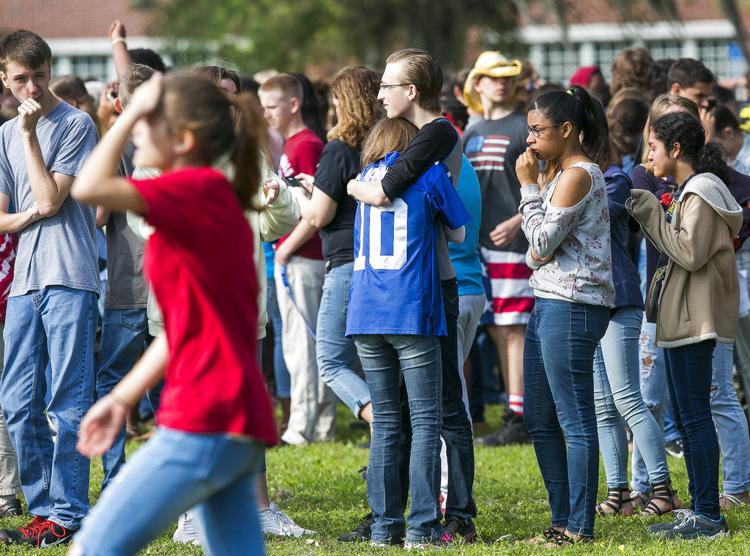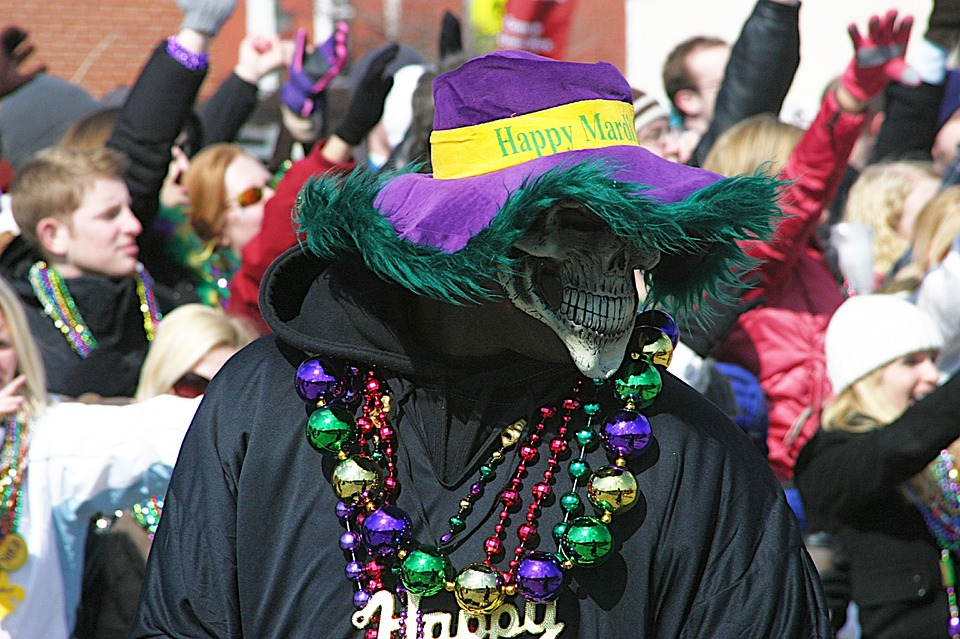
At five minutes past two a waif in gray pinstripe pants, a narrow black tie, and a pomaded crew cut shook his undersized umbrella gently, surreptitiously, and ducked in from the whetted gray of the Milwaukee afternoon. His flesh was pigeon gray. Inside, eyes pinging between golden globes of dangling light that hung over one hundred ovular tables, he handed his umbrella to a stout cashier with sad eyes and a floating smile that did not seem part of her face. She hesitated, breathing in and turning still redder than the rosacea already made her, holding the metallic ribs covered in plastic the way a child holds a dead bird, perched there on the front porch, preoccupied with the flightless thing and so unwilling to reach out and ring the bell.
Enough.
"No one in the whole cafeteria recognized him, though most did manage to get a good glimpse of his resigned eyes, and the itching lower lip reined in by a bite. He did not say a word before, during, or after he riddled seventeen bodies dead."
The metal and plastic fell and clanked as with one hand she held the cash register closed, her shaking other searching for her phone. Dirt already under the just-cut fingernails. The waif’s scrawny hands, feigning elegance under gray-gloves so soft, clamped around her wrist. Look up. His eyes calmed, almost kindly, as her leg shook. “Get yourself something nice, somewhere,” he managed to say without moving his jaw, prying open her clench until she parted it and he placed there a ten dollar bill, mouth-shut until he gave her a reassuring smile, betraying a hole where an incisor once was, nodding toward the door of the university cafeteria. Then the turnstile spun and erased her into the drear. A janitor who sat next to her on the same 22 line—who had almost stayed home on account of the gross greenish mucus that lined her eight-year old’s eye—dropped the mop mid-ring and watched a chalky, inky splash dirty the floor she just had finished cleaning. “God help me, Jesus! Girl! Hold up!” she shouted, leering sideways at the ghost of a man, giving a fierce, v-shaped brow and forgetting her bum ankle as she shot after the cashier and also escaped. Her son. She’d nearly kept him home, but his attendance was awful and the scholarship that kept him at St. Jude’s . . . Her son. She slouched towards him. She did not look back.
A student, bent over to breath in the dark chocolate heat of her double mocha, lipstick moistening and coloring the pale cup purple, looked up from a text message that said LOL HELL YES! and saw the ghost of the man’s heart slip through his teeth as he filled her and sixteen other bodies with soft point bullets.
No one in the whole cafeteria recognized him, though most did manage to get a good glimpse of his resigned eyes, and the itching lower lip reined in by a bite. He did not say a word before, during, or after he riddled seventeen bodies dead.
Countless shots. Someone would count them. Part of the ritual. A tally. Pick up the pieces, put them in a pot, cook some sense out of it all.
He watched them fall the way his grandpa, who has worked the cornfields for fifty years, watches stalks collapse, satisfied to see them arch toward the earth under gravity’s ache. As if what he did to them would have happened regardless, not on account of his gun but because of some larger circuitry of causality that he brought to inevitable and enlightened completion. He did not run when the police came. His tongue never touched the muzzle of the pistol, tasted neither the metallic barrel nor the small columns of lead with which he had reduced the total world population of debtors. As sure of his purpose as he was a surefire. Impeccable aim.
The shooter spared journalists everywhere the familiar ritual of rifling through internet scrawlings and interviews with friends to find the true motive. “Saving them lives of misery,” the police report quoted the killer. “I’d rather be in prison anyhow,” he went on, “than keep living under the long arm of the bank. Con game. College. Conspiracy.”
In the hidden back alleys or basement furnaces or overwhelmed sewers of his chemical synapses? No despair there. No record of therapy or of psychotropics; he was not known to have been an impatient or an outpatient. Bosses spoke of his signature calm, an assumed asset that now seemed a lie.
The man, Michael Watt, had taken the Greyhound to Charlotte a year earlier to work in internet technology for the Bank of America. He had remained there, with punctual punch-ins, “a real hard worker, if not the best collaborator, but many from IT aren’t,” his supervisor said, leaking nothing when the frog-throated reporter rattled him, asking if it was true that they fired Watt for asking too many questions about privacy and piracy and the easy-to-puncture protections coding customer data. Watt had studied computer science and philosophy at Marquette. His unpaid student loans amounted to eleven thousand, ten percent of the debt he had acquired when he had walked across the stage at commencement. (He had not walked across the stage at commencement. “They spoke his name through the microphone,” his ethics professor said. “I gave him a little nudge with my eyebrows, a little nod. He just held onto that seat. Knees in. Legs angled out.”)
Ex-girlfriends named him a gentleman, cited his humor and roses. His creditors claimed no qualms—no missing monies. His case made no sense. Given his salary, several more years at his current rate of repayment and the bright blue bills that both blew up on his screen and appeared, nonluminous and redundant in the mail, would have ceased completely.
Millions and millions of eyes ogled the Marquette alumni, half-listening to the reporters, who bantered from the crime scene to the newsroom and back, the camera lights like luminous fingernails scratching their heads and faces as they tried to say what was right.
Millions of others turned off devices, swapped sites, switched channels, replacing the clean-cut killer (my son’s age . . . my brother has that shirt . . . looks like my grandson . . . who’re his parents? . . . that day I almost did it), surging whatever was not him into the swelling images burning their minds. Sucking in anything else at all and so drowning out the shooting. Flushing him out in the whirling toilets of their brains. But the stench remained, the mucky waste making its way back up the pipes and filling the noses of their souls. Click away.
***
Laying across her yellow couch, a woman looked around her own home as if it were a hotel. Each time she flexed her leg or turned from side to back, the leather let off the sound of an untouchable, well-fed cat savoring a hand-rolled treat. Cities and cities away from the Milwaukee gray that glowed from her screen, she shook a plastic chute colored the warning orange of traffic lights. Two pills instead of one fell into her palm, and she stuck these little medicinal bullets between her fore and her middle fingers for play. Forming her hand into a faux gun, she feigned a trigger against her temple before she stuck the make-believe muzzle into her mouth. Next she swallowed them and shook the remainder as though for good measure—to be sure more remained. The column, wrapped in warnings and side effects unreadable in the soft light, seemed to make a sucking sound, jealous of its contents. Whooip. Stuck. Half undone, drowsed under the mellow droning sound that emanated from the tuning forks and the high strung harps that sang in the hollows of her bones, she arrested an armful of strength and tossed the pill bottle at the screen. A few loosened and flew forth like black stars shooting against the milky gray screen.
Like a child at play she crawled across the floor. Scraped them from the carpet. In her palm, the little things looked like untended eggs, harmless and helpless and in need of nurture. (In a small pinhole of her soul she knew they would care for her, comfort her, take her into their unknowing dark). Without them she could no longer sleep. Not ever, but especially not tonight, as the young man who did what he did in the cafeteria—which also looked so familiar, looked even like the one at her new workplace, as though dining spaces were increasingly cut from the same mold, designed by the same mastermind and built in the same mold, designed by the same mastermind in the same factory—he was the one she had known through the internet; she had dated and even almost moved to Charlotte for him, for his letters, those long scrolls of tenderness that told her only about her. Never about him. Which was why, after six months, she stopped answering. Did not tell him why.
Now, curled up against the west coast, looking out on the ocean from the glass-walled condo her uncle had given her when, no longer able to go it alone, he surrendered to the nursing home, childless as he was and her godfather. (That supposedly meant something, him being her godfather, but she had never known exactly what, since neither of her parents believed in God.) She kept the lights out nearly always, trying to figure out how someone could live seen by so many who stalked and walked and panhandled below (though she bit her lip at this, balked at her own vanity), waiting for the blinds she had ordered last week, upon arriving. Her job—combing through spreadsheets of dental records for insurance companies—gave her the flexibility to move here from Texas and keep the same salary, the privilege of working from home, alone, all alone. All along. Except she could not do alone what she did now. Endure.
Quick. Crush the little pills into particles still smaller. Numerous as the sands of the sea and therefore split up into so many, powerless. Descendants. He had wanted children. One of the categories on the dating site. The first man she’d dated who didn’t recycle some variant of the same: “How could I bring children into this world?” The killer sent his older sister’s children not only birthday cards but coloring book pages created by an algorithm he had made with his own hands. Michael. He had served as babysitter according to the algorithmic semi-randomness that ruled the busied lives of his childhood neighborhood, babysat in fact the whole neighborhood’s brood when young. All of this unburied from the plastic bins of a past so long shoved into the back corner of a garage, so long coated in mildew, kept beyond consequence under decades of dust. One of his former charges, then seven and now seventeen, said Watt did scold him once, scared him out of his cavalier discharge of squirt gun water, insisting that if the police happened to cruise the street at the same time that the kid pulled the trigger they might not pause to distinguish between cold-blooded killer and childhood playthings. The shooter had said this. Stunned, the kid kept this newfound fear to himself and crunched underfoot the toy he’d nagged his parents for. Shoved the shards through a sewer grate. This was the only sign. Otherwise, Watt’s well-lit life contained no clue.
***
Watching it all from his wheelchair, unable to hear but squinting so as to follow the scrolling caption across the bottom of the television, a seventy-three-year-old Henry leaned close to the screen and cleaned longstanding smudges with his faded wet red handkerchief. Arrested, he watched. He who had shot and killed a village under orders, killed and shot them as they sat there eating, told himself while eliminating them that they’d be freer as ashes, sifted and slipping through the shaky hands of the American army and the ruthless fists of the Communists both. Cleaned the screen to see the scene more clearly. The shots of sprawled death sheared from his mind the woolen lies, stripped the sophisticated yarns that softened what he’d done. Barbed wire and bones and bullets. Babies too small to breathe without milk. (Say one were to survive, crawl out from the ash of a collapsed house, tomorrow, after the soldiers had passed on to the next mission. No more. No heartstrings tied to babies in war. Future enemies. Babies. No. No babies.
Mothers’ moans that melted the red-blooded moon. Last breaths of children but most made instantly quiet, little wheezings eerier in combat, the quiet crueler somehow. (Armchair watchers elsewhere, condemning but benefiting. Did what I did to keep the world safe. You don’t know how good you got it. What he said to his draft-dodging brother the last time they talked.) Lapsing thoughts. Disappearing like the beers they drained that night. To keep from throttling their commander over the atrocity. What Henry had put in his veins that night and thereafter, in Vietnam. Half the troops steeled and steady heroes, half coupling with the same mistress heroin. As old as Helen in Homer, who out of Egypt brought home a medicine that erased.
Lapsing thoughts. As though his head refused the blood the heart sent there. Unable to both live and let live the truths that threatened to throb. Cutting off circulation until he was outside of himself, unconscious of all the dying thoughts that had hounded him, studying the man in the wheelchair like a portrait painter, gleaning the substance from the surface, thrilling at the way the watercolor eased the loneliness into pastel impressions, until he became a forgotten hero finally given his flying colors. Levity. But then the IV drip kinked and he sat up and again saw the blood on the TV. Almsgiving covers multitude of sins. I’ll never earn enough alms to cover the graves I made. Almost ceased his breathing until a loud and irritating ring roused him.
“Can you hear me, Unc?” she asked, stretching out on the couch that crooned like a petted cat, extending her hand to the artificial fireplace whose digital flames gave off heat, “I’m just calling to be sure you’re okay. I’ve been worried you’re lonely in that new place. I’m looking at tickets. You can pay to have someone assist you on the airplane. A kind of aid. You wouldn’t need to travel alone. Just a thought. This place is . . . actually, a little big for me. And I’m not getting married anytime soon. Not to say never. Not that I’m complaining. But you’d”—she almost caught these last words and buried them in a cough, so stupid they sounded—“you’d be welcome here. We could find a home nurse. A nurse who comes into the home. I know you were worried, when you lived here, about outside. Not outside on the street but inside it’s safe in here.”
She knew, shy as he was, hesitant at every turn, his silence meant yes. Still, bent forward as she waited, she scratched at the old sore that swelled at her knee, felt the old blood fall in caked crumbs to the floor. When she lifted her finger and found fresh crimson there, she said, “Unc, come home.”

